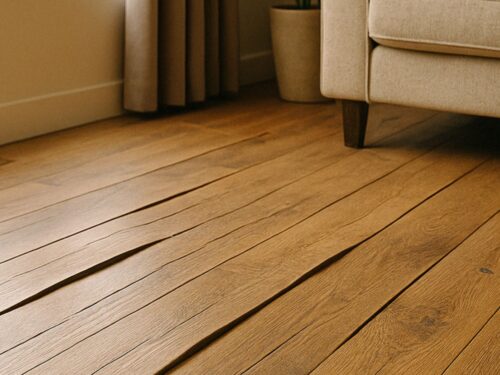
How Humidity Impacts Your Flooring (And How to Fix It!)
Humidity might not be the first thing you think about when installing new flooring—but it should be. Fluctuating moisture levels in your home can affect everything from how your floors look to how long they last. Here’s how humidity plays a role and what you can do to protect your investment.
Why Humidity Matters for Flooring
Wood-based flooring materials expand and contract with changes in humidity. When the air is too moist, floors can swell, buckle, or warp. When it’s too dry, gaps and cracks may form. Even synthetic materials like laminate and vinyl can be affected over time if moisture builds underneath.
Flooring Types Most Affected by Humidity
1. Hardwood Flooring
Natural hardwood is highly sensitive to moisture. Seasonal changes can cause planks to expand or shrink, which is why proper acclimation before installation is crucial. Learn more in our post on Luxury Vinyl Plank vs. Hardwood.
2. Laminate Flooring
Laminate has a wood core, making it susceptible to warping when exposed to excess moisture or high humidity—especially in kitchens, basements, or bathrooms.
3. Engineered Wood
While more stable than solid hardwood, engineered flooring can still shift slightly. It’s a good compromise for areas with moderate humidity swings.
4. Vinyl Flooring
Water-resistant vinyl plank flooring holds up well, but if moisture seeps into the subfloor, it can loosen the adhesive or cause mold growth beneath the planks.
How to Control Humidity in Your Home
- Use a hygrometer: This small tool measures humidity so you can monitor changes year-round.
- Keep indoor levels between 30–50%: This is the sweet spot for most flooring types.
- Use a dehumidifier or humidifier: Helps balance levels seasonally.
- Seal gaps and leaks: Prevent unwanted moisture from seeping into floors and subfloors.
Signs Your Flooring Has Humidity Damage
- Planks that cup, curl, or rise at the edges
- Visible gaps between boards
- Squeaking or cracking sounds
- Mold or mildew smells
Conclusion
Understanding how humidity affects your flooring helps you avoid costly damage and premature wear. Whether you’re installing hardwood, vinyl, or laminate, planning ahead can save you stress and money. Looking for more care tips? Read our Ultimate Guide to Cleaning Your LVP Floors.
Need help choosing moisture-resistant flooring?
Browse our product selection or talk to our team for recommendations that hold up in any season.


